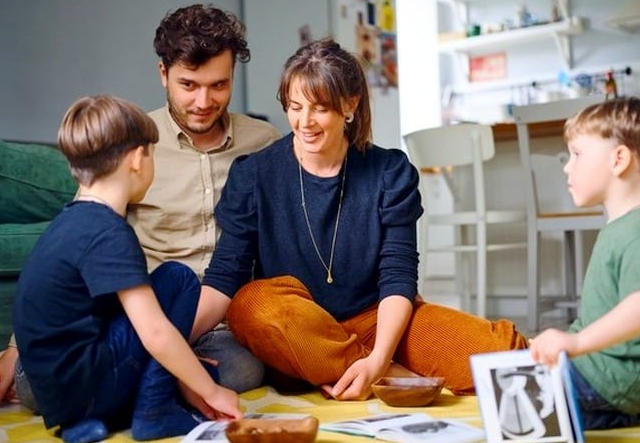What is the best way to deal with children’s mistakes?
When your child makes a mistake, how do you handle it? How do you respond to him when he is playing football, gets a bad grade, or fails in any area of his life?
Depending on the situation and what happened, parents react differently to their children, and some of them focus on why the child did something wrong, or they don’t think about it at all. Most families in these situations will judge him unfairly since he gets angry without hearing what he has to say.

What effect does our reaction have on our children?
Although we do not realize this issue ourselves, the way we respond to a child’s failure will have an eternal impact on them, and these behaviors will directly affect their self-confidence and how they deal with challenges, and parents’ reactions to a child’s failure can also affect their child’s intelligence.
Parents who take their child’s mistake as a good omen will increase their child’s self-confidence and increase his intelligence, and their belief about their own intelligence will also have a great impact on their performance.
What are the best ways for parents to convey this message to their children?
This section of the Namnak site offers you methods for giving correct answers to children’s mistakes.
Keep an eye on your child’s reaction:
Consider the child’s reaction to failure before taking any action. Does he feel satisfied that he did his best? Does he feel angry at himself? Is he scared and worried? Manage his emotions so he can give his best effort next time and be motivated to do so.
Keep an eye on the future:
Rather than focusing on the past and how he failed, talk about what he can do better next time and how every mistake can lead to success.
Examine your own behavior:
Consider how you treated your child when he made a mistake in the past. Is your advice useful to him in these situations and did you play a supportive role? How did you interact with him? Did you speak calmly and warmly to him or were you violent and negative? Motivate him instead of disappointing him.
It is important not to convey sympathy with misplaced consolations, because that will hurt him and send the message that humans are weak, but rather tell him that I am very sorry that this happened, but this is a path to success.
As an example of his failure:
Assure your child that this result will not affect others’ perception of his personality and abilities, and that he can still excel in many areas despite the result.
Tell him about times when you failed and then achieved great results, and assure him that everyone fails in life, and he is no different.
Get together and do something fun:
Focus on ideas and strategies that can help solve this problem better the next time to restore the child’s self-confidence and increase his self-confidence.
Don’t try to hide his mistake:
You can only advise him in this way and remind him of your unreserved love by fixing your own mistakes. Then your child will regain his self-confidence and know that his family is behind him no matter what mistakes he makes.

Let’s talk about randomness:
Did he break a plate in the kitchen or did he get dirty without intending to? Remember these mistakes before crushing your child’s character. Tell him they were totally unintentional, and usually children will notice these mistakes sooner. Make sure he doesn’t spill his water bottle on purpose.
Also, remind yourself that his mistake was completely accidental, which helps you keep calm, and that everyone makes mistakes, even you.
Give your child a thank you:
After the child accepts his mistake, thank him verbally. Yes, before you crush his character, thank him for realizing his mistake and before you warn him to be more accurate, thank him for being honest.
Children can learn from common mistakes. If your child makes a mistake, you should not embarrass them. It is better to teach them what to do and what not to do based on these mistakes. Allow your children to make mistakes and teach them how to control their emotions.
Make sure you avoid these mistakes:
Despite the fact that you can’t prevent them from making mistakes, you can remind them of common mistakes so they don’t make them, for example, don’t allow them to play in dirty areas and teach them more correct and healthy activities. Keep a glass of water or a cup of coffee away from him.
You shouldn’t force them to edit:
Teach them that if nature hurts one person, the world will hurt them all. The voice of nature can show our children the results and effects of their work when we protect them from physical dangers.
If your child makes a mistake in front of you, don’t blame him or remind him that he did something wrong, but rather listen to him and ask him for help. Let the child describe the experience and describe it in his own words.
What should we do next when children make mistakes?
After understanding how to behave in this situation, you must also teach the child that if he behaves differently the next time, he will get a different outcome.
Rather than blaming himself for these mistakes, encourage him to do something worthwhile instead, and remind him not to be too idealistic, but instead to maximize his efforts.
Taking our mistake as a good omen, the child will also learn this from us and realize that we are valuable human beings, even when we make mistakes, and this will make us more confident at all stages.
Children must make mistakes in order to learn to live, so teach your child how to walk and he’ll fall down many times.
In such situations, do you blame him?
In such a situation, blaming is a silly thing, and making mistakes at other stages of life by children is no different. You should accept the mistakes and keep your peace without judgment and be sure that this experience will teach him a valuable lesson. Finally, try to be gentle with him and instead of constantly criticizing him or trying to tell him what to do, take a gentle approach. Ask him if he would like to change his ways and use his personal opinions, which will increase his confidence, and also ask him if he would like to try something different this time in such a situation.
A child who is scolded by their parents suffers in their relationship as well.
Also, they make mistakes in school, their self-confidence decreases, and behavioral damage occurs in them, for example, throwing garbage out of the car window. Therefore, all the child’s behavior in the future depends on you.


